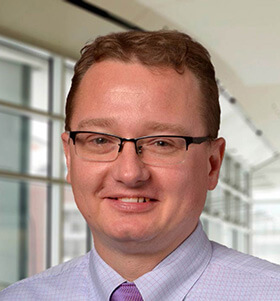August 24, 2021:
Robert Wesolowski, MD, associate professor at The Ohio State University College of Medicine, was recently appointed as co-chair of the Big Ten Cancer Research Consortium’s Correlative Sciences Clinical Trial Working Group (CTWG). He joins fellow co-chair Thomas G. Sors, PhD, Assistant Director of the Purdue Institute of Inflammation, Immunology and Infectious Disease. The group serves as a resource to advise investigators on the correlative aspects of Big Ten CRC studies in development.
“As a clinical trialist, this appointment fits my research interests,” said Dr. Wesolowski, a breast cancer medical oncologist at The Ohio State Comprehensive Cancer Center – Arthur G. James Cancer Hospital and Richard J. Solove Research Institute (OSUCCC-James). “I think it is beneficial for both the working group and investigators to brainstorm ideas for correlative studies in clinical trials.”
Dr. Wesolowski is a graduate of SUNY Downstate Medical College in Brooklyn, New York. He completed both his residency and his fellowship at Cleveland Clinic. His research interests are in breast cancer, cancer immunology, and developmental therapeutics. He also has expertise in leading Phase I clinical trials and launched the Solid Tumor Phase I Clinic in his institution.
“I look forward to working closely with Dr. Wesolowski as co-chair of our unique working group,” said Dr. Sors. “Our group will benefit greatly by the expertise he brings and his team-oriented approach.”
At OSUCCC-James, Dr. Wesolowski is a co-chair of the Data Safety Monitoring Committee and co-director of a clinical trials workshop for fellows and junior faculty. He also leads a lecture series and several educational sessions. He is part of a research laboratory researching how to inhibit or destroy myeloid-derived suppressor cells with the goal of boosting antitumor response and improving responses to immune checkpoint inhibitors in patients with cancer.
With his appointment to the Correlative Sciences CTWG, Dr. Wesolowski wants to increase awareness of the types of correlative studies that the Big Ten CRC can conduct.
“I see this group as a great resource for clinical trialists to figure out the most effective ways to do correlative science,” he said. “We want to minimize the number of correlatives that would not give us any useful answers and focus on answering clinically relevant questions, such as which patients will most likely benefit from the treatment of a trial, or which patients may not benefit. Research is only useful if it changes clinical practice.”
In triple negative breast cancer, he said, researchers have learned PD-L1 expression is helpful in selecting patients who benefit from immune checkpoint inhibitors. “The standard of care was changed in a way that every patient with triple negative breast cancer now is tested for PD-L1 expression when they relapse to metastatic disease,” Dr. Wesolowski said.
He said he hopes investigators, especially those who are early in their careers, will take advantage of the opportunity to share their study concepts in a collegial atmosphere where their protocols can only be strengthened.
“We certainly can give junior investigators a platform to present their ideas and then critically evaluate them in such a manner that the investigator will get something out of it and their study will be greatly improved,” Dr. Wesolowski said. “We can also guide the investigator through the process in such a way that they will be able to successfully open and complete their research study.”
He said more seasoned investigators can contribute their expertise to help address barriers younger researchers might encounter.
“Research is something you cannot do alone; you have to collaborate with others,” Dr. Wesolowski said. “In this type of environment, we learn and make discoveries together, and along the way to publication, we all give each other credit for hard work.”
About the Big Ten Cancer Research Consortium: The Big Ten Cancer Research Consortium was created in 2013 to transform the conduct of cancer research through collaborative, hypothesis-driven, highly translational oncology trials that leverage the scientific and clinical expertise of Big Ten universities. The goal of the Big Ten Cancer Research Consortium is to create a unique team-research culture to drive science rapidly from ideas to new approaches to cancer treatment. Within this innovative environment, today’s research leaders collaborate with and mentor the research leaders of tomorrow with the unified goal of improving the lives of all patients with cancer.
About the Big Ten Conference: The Big Ten Conference is an association of world-class universities whose member institutions share a common mission of research, graduate, professional and undergraduate teaching and public service. Founded in 1896, the Big Ten has sustained a comprehensive set of shared practices and policies that enforce the priority of academics in the lives of students competing in intercollegiate athletics and emphasize the values of integrity, fairness and competitiveness. The broad-based programs of the 14 Big Ten institutions will provide over $200 million in direct financial support to more than 9,800 students for more than 11,000 participation opportunities on 350 teams in 42 different sports. The Big Ten sponsors 28 official conference sports, 14 for men and 14 for women, including the addition of men’s ice hockey and men’s and women’s lacrosse since 2013. For more information, visit www.bigten.org.















Subscribe to the Big Ten CRC Newsletter X
X Facebook
Facebook YouTube
YouTube